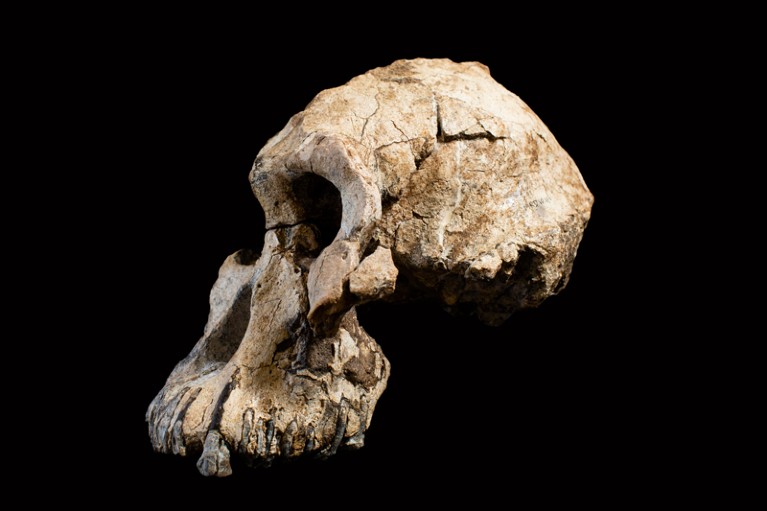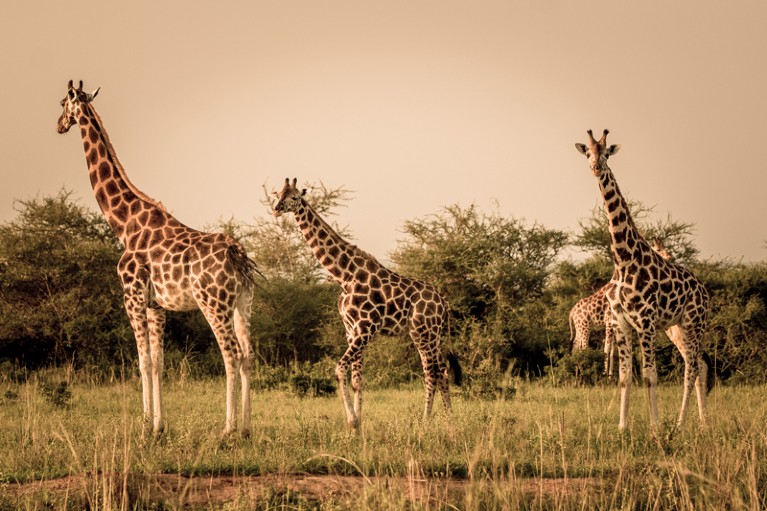RESEARCH
3.8-million-year-old skull discovered Scientists have discovered a 3.8-million-year-old hominin skull (pictured) in Ethiopia that could help to clarify the origins of Lucy, our famous forerunner. The specimen suggests that Lucy’s species coexisted with an ancestor in the ancient Ethiopian landscape. Most researchers think that Lucy’s species, Australopithecus afarensis, falls on the same branch of the evolutionary tree as an earlier species called Australopithecus anamensis. The idea is that A. anamensis gradually morphed into A. afarensis, implying that the two species never coexisted. The skull, described this week in Nature, suggests otherwise. The fossil’s facial features indicate that it belongs to A. anamensis, and strengthens the case that a previously discovered fossil, a 3.9-million-year-old face fragment found in the 1980s, belongs to A. afarensis. This suggests that the two species coexisted, after all. A. afarensis may have evolved from a small A. anamensis group before gradually outcompeting the wider A. anamensis population.

A remarkably complete skull of the species Australopithecus anamensis, thought to be 3.8 million years old, has been discovered in Ehthiopia. Credit: Dale Omori/Cleveland Museum of Natural History
INSTITUTIONS
Alaska funding Tenured faculty members in the University of Alaska (UA) system no longer face the possibility of being laid off with 60 days’ notice. UA’s governing board voted unanimously on 20 August to reverse its declaration of “financial exigency”, which it made in July in response to an unprecedented US$135-million cut to state funding for the university system. Financial exigency grants the board extraordinary powers to reduce costs, including the ability to fire faculty members and end academic programmes. But the budget crisis eased on 13 August, when Alaska’s governor Michael Dunleavy and UA administrators agreed to a smaller, $25-million cut this year. The UA governing board will meet in early September to discuss how to distribute this year’s cut, and a proposal to consolidate the system’s three main branches — in Anchorage, Fairbanks and Juneau — into one accredited institution.
MIT inquiry The Massachusetts Institute of Technology (MIT) is launching an investigation into its interactions with sex offender and alleged sex trafficker Jeffrey Epstein. The university, in Cambridge, Massachusetts, received about US$800,000 in donations from the disgraced financier over two decades, MIT president Rafael Reif said on 22 August. All of Epstein’s donations went to either the MIT Media Lab or to physics professor Seth Lloyd. “In this instance, we made a mistake of judgment,” Reif said. Lloyd and MIT Media Lab director Joichi Ito have issued public apologies for their dealings with Epstein. The MIT announcement came days after two researchers cut ties with the Media Lab because of the university’s interactions with Epstein.
HEALTH
Polio milestone Polio is no longer endemic in Nigeria, the World Health Organization (WHO) said on 21 August, as the country marked three years without any new cases of the paralysing disease. Nigeria is the last country in Africa in which polio has circulated in the wild; now, the entire continent could be declared polio-free next year. The WHO, private donors and governments have led a multibillion-dollar global campaign to eradicate polio. The number of new infections has fallen globally, from roughly 350,000 in 1988 to 33 in 2018.
POLICY
UK immigration The UK government has said that freedom of movement as it currently stands for European Union citizens will end as soon as the country leaves the bloc on 31 October. This means that EU scientists coming to work in the United Kingdom after this date would be subject to new immigration arrangements, which the government promised to publish “shortly” in an announcement on 19 August. The previous government’s policy would have left the rights of EU citizens coming to study or work in the United Kingdom essentially unchanged at least until the end of next year. Experts have questioned whether it is possible to implement a new immigration policy without a way of distinguishing between existing EU migrants, whose rights remain unchanged, and those arriving in the United Kingdom soon after the Brexit date. Science organizations have expressed concern at the move, which they say creates uncertainty among employers.
ENVIRONMENT
Giraffe protections Nations have agreed to regulate trade in giraffes (pictured) for the first time. The decision — which is expected to be finalized this week — was made at a meeting of parties to the Convention on International Trade in Endangered Species (CITES) in Geneva, Switzerland. Nine giraffe species will be protected under Appendix II of the convention, which protects species that could have faced extinction had trade restrictions not been implemented. Countries also voted to protect 18 shark and ray species — many of which are hunted for their meat and fins — under Appendix II. But the parties stopped short of approving amendments to shut down all domestic ivory markets.

Giraffes have won protections under the international wildlife convention CITES.
Trump lawsuit A coalition of environmental groups filed a lawsuit against the administration of US President Donald Trump on 21 August to block a rule that weakens protections for threatened species. The changes — finalized on 12 August by the Fish and Wildlife Service and the National Marine Fisheries Service — affect how the Endangered Species Act is applied, and constitute some of the most significant alterations to the law since it was enacted in 1973. The revisions remove blanket protections for animals and plants that are listed as threatened, a category for organisms at risk of becoming endangered. The changes also allow federal agencies to conduct economic analyses when deciding whether to protect a species.
Amazon funds Brazil has rejected an offer from the world’s seven largest economies (G7) to provide US$22 million in immediate funding to help put out fires in the Amazon (see ‘Trend watch’). The fund was put together by France’s President Emmanuel Macron and pledged at the G7 annual meeting in Biarritz, France, on 26 August. After initially accepting the funding, the Brazilian government declined the offer. Earlier, Macron’s decision to put the Amazon on the G7 agenda angered Brazil’s President Jair Bolsonaro, who accused France of acting in a colonial way. Bolsonaro said that he is mobilizing Brazil’s military to drop water on burning regions, and that Amazon countries should be able to deal with the issue without outside help. The G7 meeting had a strong focus on the environment and development, and also produced an agreement between the European Union, the G7 and international funding agencies to provide more support for the countries of the Sahel.
SPACE
Moon mission India’s Chandrayaan-2 spacecraft entered the Moon’s orbit on 20 August, says the nation’s space agency. The event is a milestone in the country’s second mission to the Moon: it will be its first attempt at a ‘soft’ landing on the lunar surface. Early next week, the lander will separate from the orbiter, which will continue to circle the Moon for another year. The lander, which carries a six-wheeled rover called Pragyan, is due to touch down near the south pole on 7 September. If the landing is successful, India’s will be the fourth space agency, after those of the United States, the Soviet Union and China, to perform a soft landing.
TREND WATCH
The Brazilian Amazon is burning, and the world is taking notice. So far this year, more than 80,000 wildfires have burnt in Brazil — the majority in the Amazon — amounting to an increase of roughly 80% over the same period last year, according to the country’s National Institute for Space Research (INPE). The Amazon is the world’s largest rainforest and it contains several million plant, animal and insect species. It also acts as a huge carbon sink that helps to cool global temperatures. The wildfire data, which INPE released on 20 August, have prompted an international outcry. In a tweet on 22 August, French President Emmanuel Macron called for discussion of the fires at the G7 summit he was hosting in Biarritz from 24 to 26 August. German Chancellor Angela Merkel backed Macron’s call. But Brazilian President Jair Bolsonaro hit back, tweeting that Macron was using the situation for his own political gain. Critics of Bolsonaro say that his push to make the Amazon more accessible to industries such as logging and agriculture is partly responsible for the rise in the number of fires.

Source: INPE



